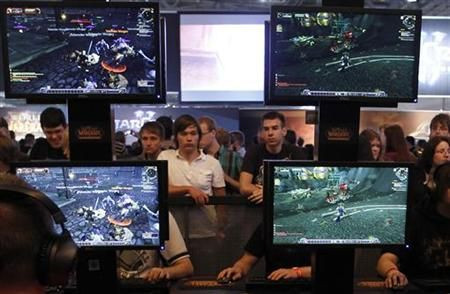Inside The Economy Of Virtual Currency

It might be called virtual currency, but make no mistake about it, it is very real.
In China, Liu Dali, a former inmate at the Jixi labour camp, recently told The Guardian prison guards would make him and other inmates play hours and hours of the popular role playing game, World of Warcraft. The guards had Liu and the others building up credits by collecting virtual goods and currency over 12-hr periods by performing simple tasks within the game.
The currency then would be subsequently traded for real money. The practice, which is called gold farming, earned the guards an estimated 5,000 to 6,000rmb (U.S. $770 to $925) per day according to Liu.
This is just one of many stories that show the real value of virtual currency. For years, games like World Of Warcraft have thrived off virtual currency and credits, which when built up over time give the gamer added advantages. However, the rising popularity of games like World Of Warcraft, have meant virtual currency has become more than just a fun add-on to the game.
It's a multimillion dollar economy and its own commercial enterprise, Scott Steinberg, chief executive officer of video game consulting firm TechSavvy Global. It's a fairly large sector and fairly mature.
The importance of virtual currency is not limited to World of Warcraft. In 2007, a man broke the Guinness Book of World Records for buying the The Most Expensive Virtual Object. He paid $100,000 for an asteroid space resort in the game Entropia Universe, another massively-multiplayer online game. Meanwhile, Zynga has grown from a gaming startup and virtual unknown to a valuation of $10 billion.
The importance of vitual currency is making itself felt in China, where gold farming has become widespread. According to a report from the China Internet Center in 2008, 80 percent of gold farming for World of Warcraft is done in China. There are 100,000 full-time gold farmers in China alone and in 2008; $2 billion in virtual currency was traded in the country.
In 2009, the Chinese government attempted to restrict the trading of virtual currency and gold farming with a nationwide directive. The law said businesses without licenses couldn't trade virtual currency for real money. However, Liu says the problem still persists.
Many prisons across the north-east of China also forced inmates to play games. It must still be happening, Liu said.
Steinberg says for true gamers, gold farming is an unfortunate side effect from the growing popularity of games like World of Warcraft. Most gamers don't think it's fair that the people with the deepest pockets should be given unfair advantages. The highly rare items and goods should be a reward for loyal players, not sold to whoever has a buck to spend, Steinberg said.
Publishers, like Activision Blizzard, which produces World of Warcraft, aren't big fans of gold farming either. According to Michael Pachter, video game analyst at Wedbush Securities, the company has several reasons for disliking the practice, even if technically, it means more people are playing the game.
They have the belief that if someone is profiting from selling goods, it should be them, Pachter said. Also, they are intellectually honest. They want guys to earn their way in. They want people to be engaged, and if they are going to buy goods, they want it to be through them. But they haven't found a way to stop it.
Activision Blizzard will ban any player caught gold farming. However, as Pachter said, it's hard to catch someone in the act. Some gold farmers can even automate the process and still not get caught.
Activision Blizzard did not respond to a request for comment.
© Copyright IBTimes 2024. All rights reserved.





















